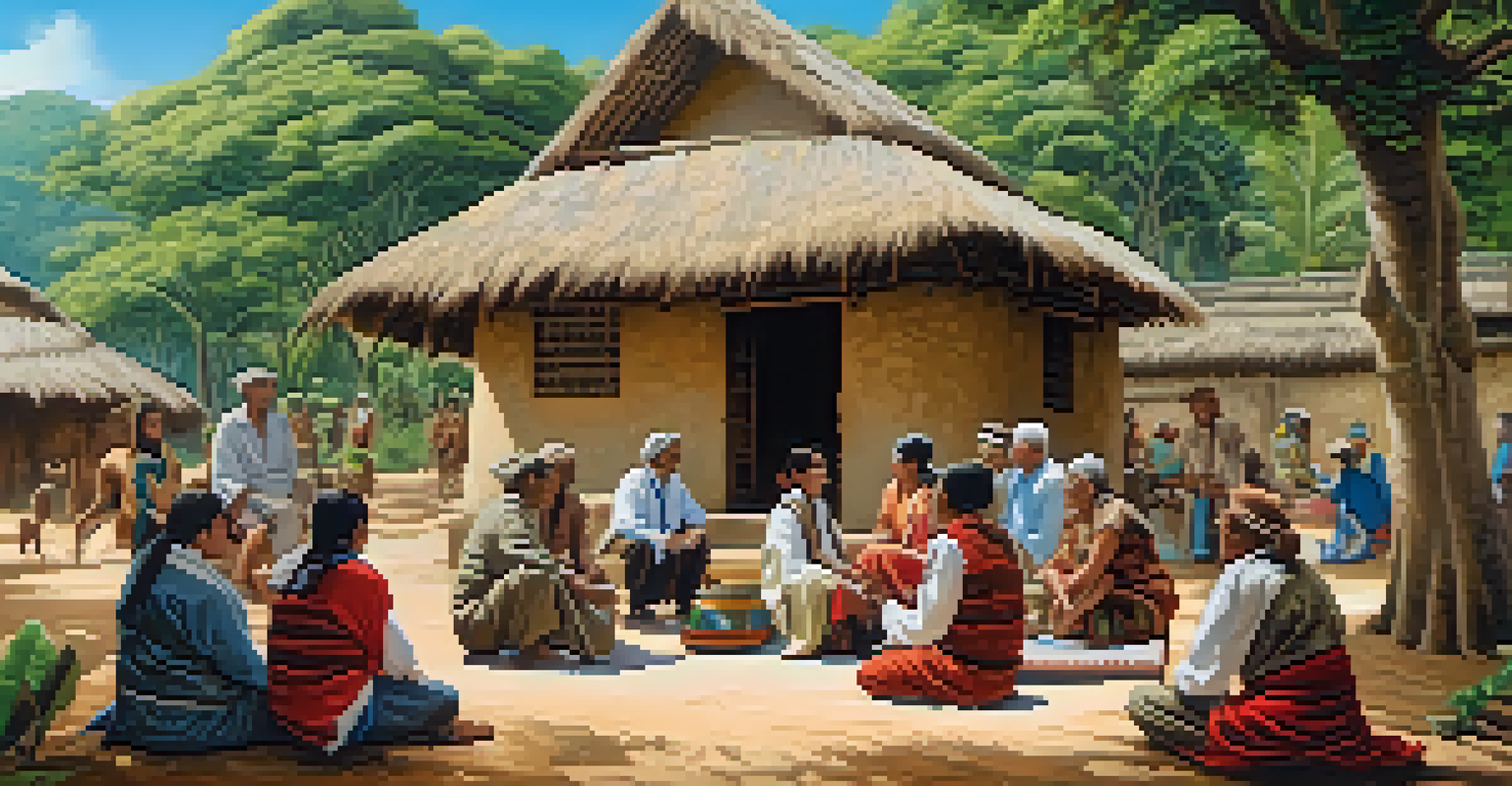Naturopathy in Latin America: Cultural Healing Practices Explored

Understanding Naturopathy: A Holistic Approach to Health
Naturopathy is a holistic healing approach that emphasizes the body's inherent ability to heal itself. It combines various natural therapies, including herbal medicine, nutrition, and lifestyle changes, to promote wellness. In Latin America, this practice is deeply intertwined with cultural traditions, making it a unique blend of indigenous knowledge and modern wellness techniques.
The greatest medicine of all is to teach people how not to need it.
The roots of naturopathy can be traced back to ancient civilizations, where healing was often performed by shamans or traditional healers. These healers utilized local plants and natural remedies, passing down their knowledge through generations. Today, this rich heritage is being integrated into contemporary health practices, showcasing the importance of cultural context in healing.
In Latin America, naturopathy is not just a medical practice; it’s a way of life for many communities. The emphasis on preventive care and natural remedies aligns well with the region's values, where harmony with nature is paramount. This connection to the earth serves as a reminder of the power of nature in fostering health and resilience.
Cultural Influences on Naturopathic Practices in Latin America
Cultural beliefs play a significant role in shaping health practices, and naturopathy in Latin America is no exception. From the Inca civilization's reverence for the Andean mountains to the Amazonian tribes' use of jungle herbs, these cultural elements are woven into the fabric of naturopathic healing. Each region brings its unique flavor to the practice, reflecting its history and traditions.

For example, in Mexico, the use of plants like aloe vera and chamomile is commonplace, rooted in indigenous customs. Similarly, in Brazil, the incorporation of ayahuasca in healing rituals highlights the spiritual dimensions of naturopathy. These practices are not only about physical healing; they also encompass emotional and spiritual well-being.
Naturopathy's Holistic Healing Roots
Naturopathy integrates natural therapies and cultural traditions to promote self-healing and wellness.
Moreover, the resurgence of interest in traditional medicine has led to a fusion of modern health practices with indigenous knowledge. This blending creates a more comprehensive approach to health that respects cultural identities and promotes wellness in a culturally sensitive manner. As people seek more holistic options, these practices continue to thrive.
Common Naturopathic Treatments in Latin America
Several naturopathic treatments are widely practiced across Latin America, often tailored to local flora and traditional beliefs. Herbal remedies are among the most common, with plants like eucalyptus, ginger, and mint being used for various ailments. These natural treatments are not only effective but also readily available in local communities.
Nature itself is the best physician.
In addition to herbal medicine, therapies such as acupuncture and massage are gaining popularity. These methods, often derived from ancient practices, focus on balancing the body’s energy and relieving stress. Many practitioners combine these techniques with dietary recommendations based on local foods, further promoting health through nutrition.
Furthermore, spiritual practices such as rituals and ceremonies are integral to naturopathy in many cultures. These traditions emphasize the connection between mind, body, and spirit, creating a comprehensive healing experience. The inclusion of these elements illustrates the importance of a holistic approach to health that resonates deeply with individuals.
The Role of Traditional Healers in Naturopathy
Traditional healers, often referred to as curanderos or shamans, play a vital role in the practice of naturopathy in Latin America. They are the custodians of ancient wisdom, using their knowledge of plants and healing rituals to treat various ailments. Their deep understanding of local ecosystems allows them to utilize natural resources effectively.
These healers often work within their communities, building trust and relationships with those they serve. Their approach is holistic, addressing not just physical symptoms but also emotional and spiritual issues. This comprehensive care model is particularly appealing in cultures that value community and interconnectedness.
Cultural Influences Shape Practices
Local customs and beliefs significantly influence naturopathic treatments, blending ancient wisdom with modern health approaches.
As modern medicine becomes more prevalent, there is a growing recognition of the importance of traditional healers. Efforts to integrate their knowledge with conventional healthcare practices are underway, promoting a more inclusive approach to health. This collaboration not only honors cultural traditions but also enhances the overall effectiveness of care.
Challenges Facing Naturopathy in Latin America
Despite its rich history and cultural significance, naturopathy in Latin America faces several challenges. One major issue is the lack of formal recognition and regulation, which can lead to skepticism about its efficacy. Many practitioners work without official credentials, making it difficult for patients to discern qualified healers from those who may not be as knowledgeable.
Additionally, the encroachment of Western medicine often overshadows traditional practices. As modern healthcare becomes more accessible, some communities may turn away from naturopathy, viewing it as outdated or less effective. This shift can erode the transmission of traditional knowledge, jeopardizing cultural heritage.
Moreover, economic factors can limit access to naturopathic treatments. In many regions, lower-income communities may not have the means to afford quality herbal remedies or the services of traditional healers. Addressing these challenges is crucial for ensuring that naturopathy continues to thrive and remains an accessible option for all.
Naturopathy and Environmental Sustainability
Naturopathy inherently promotes a connection to nature, which aligns closely with the principles of environmental sustainability. By utilizing local plants and resources, naturopathic practices encourage the conservation of biodiversity. This sustainable approach not only benefits individual health but also supports the ecological balance of local ecosystems.
In many Latin American communities, traditional healers advocate for the responsible harvesting of medicinal plants. They emphasize the importance of preserving these resources for future generations, ensuring that their communities can continue to rely on natural remedies. This stewardship reflects a deep respect for nature's gifts and a commitment to sustainability.
Challenges Threaten Naturopathy's Future
Naturopathy faces obstacles like lack of recognition, economic barriers, and competition from Western medicine, jeopardizing its accessibility and cultural heritage.
As global conversations around health and the environment continue to evolve, the principles of naturopathy offer valuable insights. By prioritizing natural healing and sustainability, Latin American practices can serve as a model for integrating health and environmental stewardship. This holistic perspective encourages a healthier planet and population.
The Future of Naturopathy in Latin America
Looking ahead, the future of naturopathy in Latin America appears promising yet complex. As more individuals seek holistic health options, there is potential for growth in the practice. Increased interest in natural therapies and preventive care aligns with global trends toward wellness and sustainability.
However, for naturopathy to flourish, it will be essential to establish recognition and support for traditional healers. Creating educational programs that blend indigenous knowledge with modern health practices can empower communities and ensure the perpetuation of these healing traditions. This collaboration could bridge gaps between conventional and traditional medicine.

Ultimately, the success of naturopathy in Latin America will hinge on its ability to adapt and evolve. By honoring cultural roots while embracing modern advancements, naturopathy can remain a vital part of the healthcare landscape. This journey not only enriches individual lives but also contributes to a more holistic understanding of health and well-being.